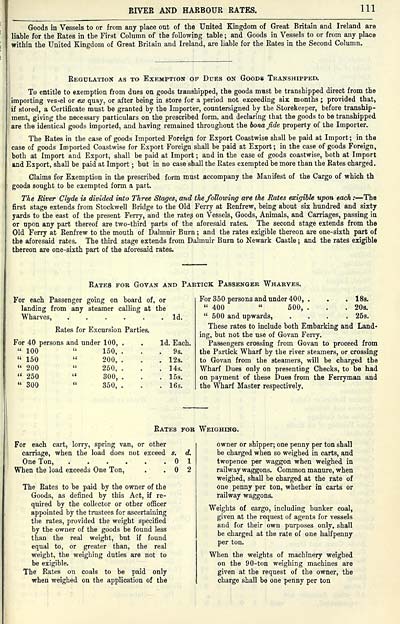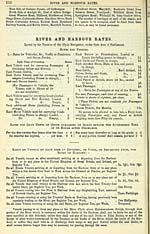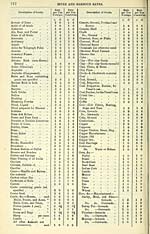Download files
Complete book:
Individual page:
Thumbnail gallery: Grid view | List view

RIVER AND HARBOUR RATES.
Ill
Goods in Vessels to or from any place out of the United Kingdom of Great Britain and Ireland are
liable for the Rates in the First Column of the following table ; and Goods in Vessels to or from any place
within the United Kingdom of Great Britain and Ireland, are liable for the Rates in the Second Column.
Regulation as to Exemption of Dues on Goods Transhipped,
To entitle to exemption from dues on goods transhipped, the goods must be transhipped direct from the
importing vessel or ex quay, or after being in store for a period not exceeding six months ; provided that,
if stored, a Certificate must be granted by the Importer, countersigned by the Storekeeper, before tranship-
ment, giving the necessary particulars on the prescribed form, and declaring that the goods to be transhipped
are the identical goods imported, and having remained throughout the bona fide property of the Importer.
The Rates in the case of goods Imported Foreign for Export Coastwise shall be paid at Import ; in the
case of goods Imported Coastwise for Export Foreign shall be paid at Export ; in the case of goods Foreign,
both at Import and Export, shall be paid at Import ; and in the case of goods coastwise, both at Import
and Export, shall be paid at Import ; but in no case shall the Rates exempted be more than the Rates charged.
Claims for Exemption in the prescribed form must accompany the Manifest of the Cargo of which th
goods sought to be exempted form a patt.
The River Clyde is divided into Three Stages, and the following are the Rates exigible upon each : — The
first stage extends from Stockwell Bridge to the Old Ferry at Renfrew, being about six hundred and sixty
yards to the east of the present Ferry, and the rates on Vessels, Goods, Animals, and Carriages, passing in
or upon any part thereof are two-third parts of the aforesaid rates. The second stage extends from the
Old Ferry at Renfrew to the mouth of Dalmuir Burn ; and the rates exigible thereon are one-sixth part of
the aforesaid rates. The third stage extends from Dalmuir Btirn to Newark Castle ; and the rates exigible
thereon are one-sixth part of the aforesaid rates.
Rates for Govan and Paetick Passenger Wharves.
For each Passenger going on board of, or
landing from any steamer calling at the
Wharves,
Rates for Excursion Part:
For 40 persons and under 100,
" 100 " 150,
" 150 " 200,
" 200 " 250,
" 250 " 300,
" 300 " 350,
Id.
Id. Each.
. 9s.
. 12s,
. 14s.
. 15s,
. 16s.
For 350 persons and under 400, . . . I83.
" 400 " 500, . . . 20s.
" 500 and upwards, .... 25s.
These rates to include both Embarking and Land-
ing, but not the use of Govan Ferry.
Passengers crossing from Govan to proceed from
the Partick Wharf by the river steamers, or crossing
to Govan from the steamers, will be charged the
Wharf Dues only on presenting Checks, to be had
on payment of these Dues from the Ferryman and
the Wharf Master respectively.
Rates for Weighing.
For each cart, lorry, spring van, or other
carriage, when the load does not exceed s.
One Ton,
When the load exceeds One Ton, , .
The Rates to be paid by the owner of the
Goods, as defined by this Act, if re-
quired by the collector or other officer
appointed by the trustees for ascertaining
the rates, provided the weight specified
by the owner of the goods be found less
than the real weight, but if found
equal to, or greater than, the real
weight, the weighing duties are not to
be exigible.
The Rates on coals to be paid only
when weighed on the application of the
owner or shipper; one penny per ton shall
be charged when so weighed in carts, and
twopence per waggon when weighed in
railway waggons. Common manure, when
weighed, shall be charged at the rate of
one penny per ton, whether in carts or
railway waggons.
Weights of cargo, including bunker coal,
given at the request of agents for vessels
and for their own purposes only, shall
be charged at the rate of one halfpenny
per ton.
When the weights of machinery weighed
on the 90-ton weighing machines are
given at the request of the owner, the
charge shall be one penny per ton
Ill
Goods in Vessels to or from any place out of the United Kingdom of Great Britain and Ireland are
liable for the Rates in the First Column of the following table ; and Goods in Vessels to or from any place
within the United Kingdom of Great Britain and Ireland, are liable for the Rates in the Second Column.
Regulation as to Exemption of Dues on Goods Transhipped,
To entitle to exemption from dues on goods transhipped, the goods must be transhipped direct from the
importing vessel or ex quay, or after being in store for a period not exceeding six months ; provided that,
if stored, a Certificate must be granted by the Importer, countersigned by the Storekeeper, before tranship-
ment, giving the necessary particulars on the prescribed form, and declaring that the goods to be transhipped
are the identical goods imported, and having remained throughout the bona fide property of the Importer.
The Rates in the case of goods Imported Foreign for Export Coastwise shall be paid at Import ; in the
case of goods Imported Coastwise for Export Foreign shall be paid at Export ; in the case of goods Foreign,
both at Import and Export, shall be paid at Import ; and in the case of goods coastwise, both at Import
and Export, shall be paid at Import ; but in no case shall the Rates exempted be more than the Rates charged.
Claims for Exemption in the prescribed form must accompany the Manifest of the Cargo of which th
goods sought to be exempted form a patt.
The River Clyde is divided into Three Stages, and the following are the Rates exigible upon each : — The
first stage extends from Stockwell Bridge to the Old Ferry at Renfrew, being about six hundred and sixty
yards to the east of the present Ferry, and the rates on Vessels, Goods, Animals, and Carriages, passing in
or upon any part thereof are two-third parts of the aforesaid rates. The second stage extends from the
Old Ferry at Renfrew to the mouth of Dalmuir Burn ; and the rates exigible thereon are one-sixth part of
the aforesaid rates. The third stage extends from Dalmuir Btirn to Newark Castle ; and the rates exigible
thereon are one-sixth part of the aforesaid rates.
Rates for Govan and Paetick Passenger Wharves.
For each Passenger going on board of, or
landing from any steamer calling at the
Wharves,
Rates for Excursion Part:
For 40 persons and under 100,
" 100 " 150,
" 150 " 200,
" 200 " 250,
" 250 " 300,
" 300 " 350,
Id.
Id. Each.
. 9s.
. 12s,
. 14s.
. 15s,
. 16s.
For 350 persons and under 400, . . . I83.
" 400 " 500, . . . 20s.
" 500 and upwards, .... 25s.
These rates to include both Embarking and Land-
ing, but not the use of Govan Ferry.
Passengers crossing from Govan to proceed from
the Partick Wharf by the river steamers, or crossing
to Govan from the steamers, will be charged the
Wharf Dues only on presenting Checks, to be had
on payment of these Dues from the Ferryman and
the Wharf Master respectively.
Rates for Weighing.
For each cart, lorry, spring van, or other
carriage, when the load does not exceed s.
One Ton,
When the load exceeds One Ton, , .
The Rates to be paid by the owner of the
Goods, as defined by this Act, if re-
quired by the collector or other officer
appointed by the trustees for ascertaining
the rates, provided the weight specified
by the owner of the goods be found less
than the real weight, but if found
equal to, or greater than, the real
weight, the weighing duties are not to
be exigible.
The Rates on coals to be paid only
when weighed on the application of the
owner or shipper; one penny per ton shall
be charged when so weighed in carts, and
twopence per waggon when weighed in
railway waggons. Common manure, when
weighed, shall be charged at the rate of
one penny per ton, whether in carts or
railway waggons.
Weights of cargo, including bunker coal,
given at the request of agents for vessels
and for their own purposes only, shall
be charged at the rate of one halfpenny
per ton.
When the weights of machinery weighed
on the 90-ton weighing machines are
given at the request of the owner, the
charge shall be one penny per ton
Set display mode to: Large image | Transcription
Images and transcriptions on this page, including medium image downloads, may be used under the Creative Commons Attribution 4.0 International Licence unless otherwise stated. ![]()
| Scottish Post Office Directories > Towns > Glasgow > Post-Office annual Glasgow directory > 1905-1906 > (1671) |
|---|
| Permanent URL | https://digital.nls.uk/86439881 |
|---|
| Description | Directories of individual Scottish towns and their suburbs. |
|---|
| Description | Around 700 Scottish directories published annually by the Post Office or private publishers between 1773 and 1911. Most of Scotland covered, with a focus on Edinburgh, Glasgow, Dundee and Aberdeen. Most volumes include a general directory (A-Z by surname), street directory (A-Z by street) and trade directory (A-Z by trade). |
|---|


